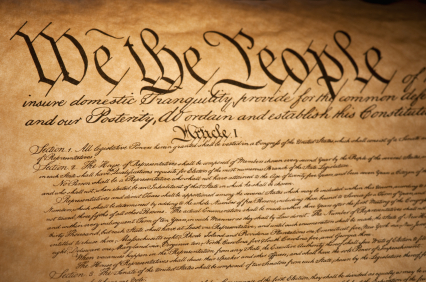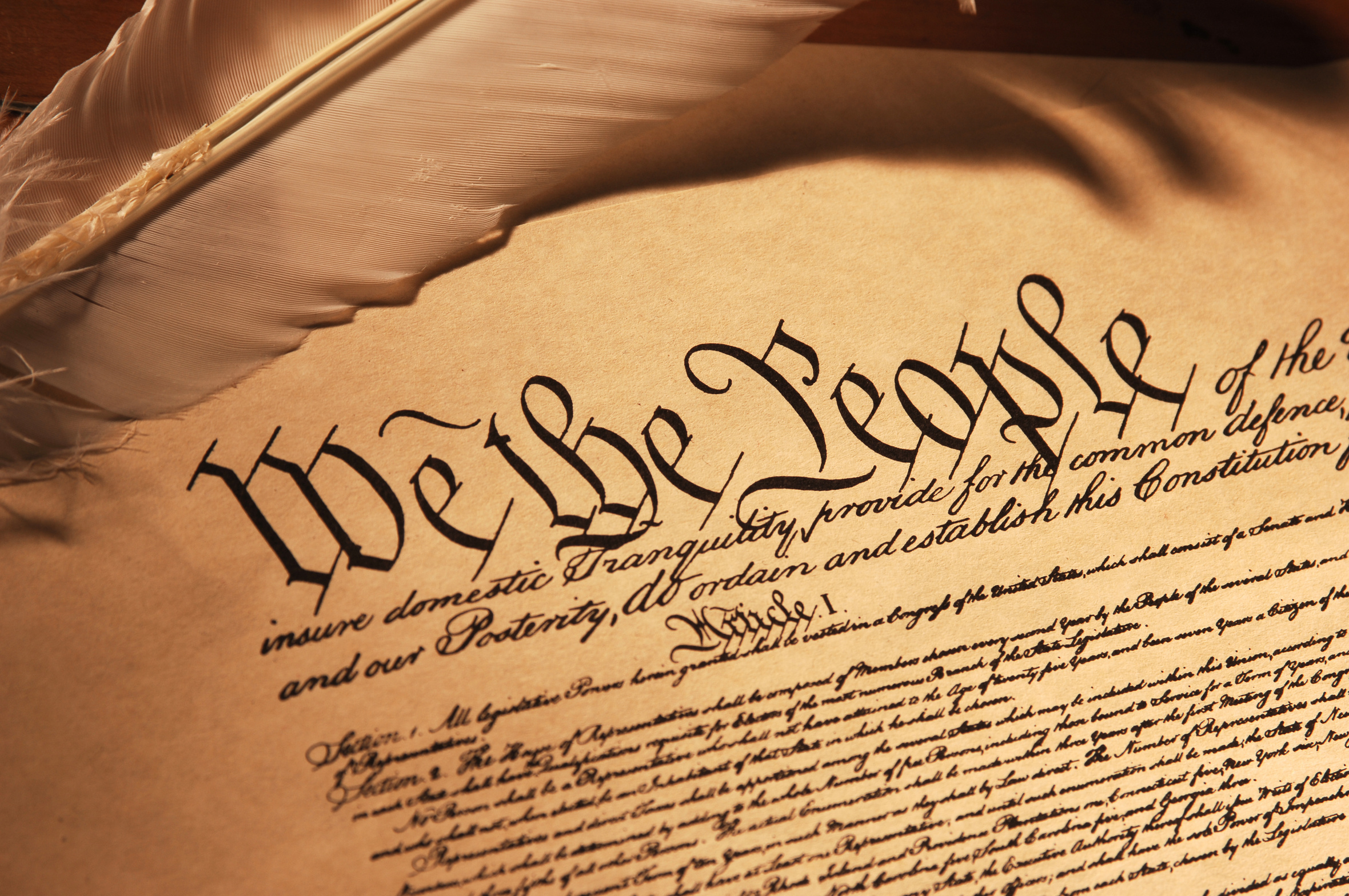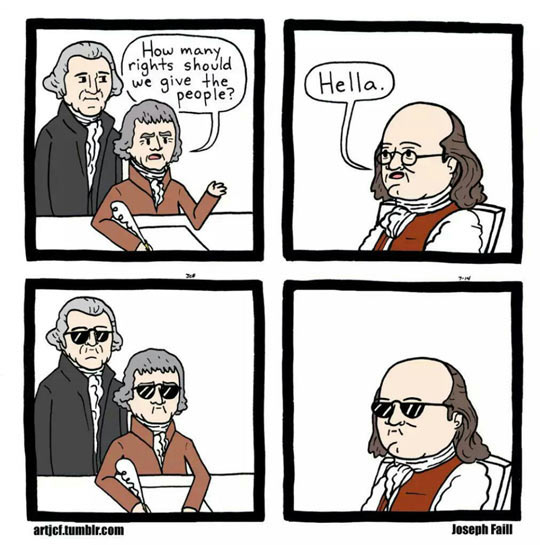I haven't written in a while, but that's because so much has been happening, I don't even know where to start. Given the current political climate, however, I think it would be good to reflect a little on American politics. Don't worry, I'm not going to try and convince any one to vote one way over the other. I'm a big believer in voting as your conscience and reason dictate, regardless of party affiliation. What I would like to focus on today, though, is something a little more basic. Something that makes up the foundation of our political structure, and outlines the freedoms citizens of the United States are privileged to. That's right, I want to talk about the U.S. Constitution (get ready for a history lesson...this post isn't very faithy).
"We the People of the United States, in Order to form a more perfect Union, establish Justice, insure domestic Tranquility, provide for the common defense, promote the general Welfare, and secure the Blessings of Liberty to ourselves and our Posterity, do ordain and establish this Constitution for the United States of America." - The U.S. Constitution
People always love to cite the Constitution when making political arguments. The two most common debates, of course, center on Freedom of Religion, and the Right to Bear Arms. I've found, that much like using the Bible to win arguments, people like to pick and choose parts of the Constitution to justify their beliefs and actions. Even to the extent of taking things out of context, or stretching words and ideas to make them fit with their own beliefs. So, today, I'd like to reflect on how people have been misusing the Constitution, and why that misuse is contributing to our current state of political and social chaos.
 |
| Lin-Manuel Miranda as Alexander Hamilton. Epicness. |
I'm currently obsessed with the hit Broadway musical Hamilton. I haven't seen it, but I've listened to the soundtrack about a million times, have most of the songs memorized, and have devoured any news story about the show. For those of you unfamiliar with the show, Hamilton tells the story of Alexander Hamilton, the youngest and one of the most controversial founding fathers. In the song "Non Stop", Hamilton goes to ask Aaron Burr, a political rival who eventually kills Hamilton in a duel, if he will help him defend the newly written U.S. Constitution. Burr immediately replies no, but Hamilton continues to try and persuade him. Burr exclaims that "The Constitution's a mess!" to which Hamilton replies "So it needs amendments." Burr follows up with "It's full of contradictions" and Hamilton shoots back "So is independence." Ultimately, Burr did not help Hamilton go on to write the Federalist Papers, which were released to the public defending the Constitution (he did manage to get James Madison and John Jay to help him, and together they wrote eight-five documents, with John Jay writing five of them, James Madison writing twenty-nine, and Hamilton writing fifty-one...just a fun fact of the day). What I like about this exchange between Hamilton and Burr is that is shows how complicated a document the Constitution is, and how much controversy there was over its development. All this is to say that the Constitution is not divinely inspired. It's not infallible. It's a living document, with Amendments being added and taken away depending on the needs and realities of the citizens of the United States at the time. What it's always trying to do, however, is protect the people of the United States. It guarantees them freedoms so that they cannot be ruled over the same way the colonies were ruled over by Britain. It guarantees a voice to all citizens, protection to all citizens, and keeps the government in check so that it doesn't forget it exists to serve rather than rule. At least, that's what it's supposed to do. When it is misused in attempts to gain power, marginalize people, or take away the rights of citizens, the whole system which is built upon it is broken in the process.
With that, I want to talk specifically about the Bill of Rights, that part of the Constitution most often used and abused in political discourse.
The Bill of Rights consists of the first ten Amendments to the Constitution. They were drafted based on concerns from the states that the Constitution was giving the federal government to much power, and they wanted guaranteed freedoms spelled out for individual citizens (
http://www.archives.gov/exhibits/charters/bill_of_rights.html). Which was a legitimate concern on their part. The U.S. had just fought its way out of British rule, which had imposed its rule on the colonies without any kind of concern for their context or care for their representation. People wanted to make sure that they hadn't fought their way out from under one tyrant to turn away and create a new one.
Now, everyone knows the jist of the First and Second Amendments, but for the sake of context I'm going to write them out for you.
Amendment One:
Congress shall make no law respecting an establishment of religion, or prohibiting the free exercise thereof; or abridging the freedom of speech, or of the press; or the right of the people peaceably to assemble, and to petition the government for a redress of grievances.
Amendment Two:
A well regulated militia, being necessary to the security of a free state, the right of the people to keep and bear arms, shall not be infringed.
Now, as much as I would love to dive into these two Amendments right now, there is simply to much to talk about, so I'm going to save them for a second post. However, I would like to point out the fact that not only does the First Amendment protect the free exercise of religion in the United States (any religion...it doesn't specify Christianity only), it also states that Congress cannot establish a religion, meaning the government cannot mandate a national religion. Ergo, the United States is NOT a Christian nation. More on that later.
I doubt as many people who are familiar with the First and Second Amendments are as familiar with Amendments three through ten.
Amendment Three:
No soldier shall, in time of peace be quartered in any house, without the consent of the owner, nor in time of war, but in a manner to be prescribed by law.
Amendment three mostly deals with the practice British soldiers had of forcing their way into homes and onto farms for shelter, without the permission of the resident or land owner. This isn't that big of a deal now, but it's nice to know that my home can't be taken over willy-nilly by the military to be used as shelter.
Amendment Four:
The right of the people to be secure in their persons, houses, papers, and effects, against unreasonable searches and seizures, shall not be violated, and no warrants shall issue, but upon probable cause, supported by oath or affirmation, and particularly describing the place to be searched, and the persons or things to be seized.
You know why in almost every Law and Order episode you've ever seen the police scramble to find a judge to sign a warrant to search a home? Because it's in the Constitution that they have to. People are protected from being randomly searched and having their possessions seized from them without just cause and a warrant. This includes things like vehicles, so an officer cannot search a vehicle during a traffic stop if they don't have a warrant...or don't see anything illegal just laying on the seat. It's really a protection of personal space. You have a right to feel safe and secure in your own home.
Amendment Five:
No person shall be held to answer for a capital, or otherwise infamous crime, unless on a presentment or indictment of a grand jury, except in cases arising in the land or naval forces, or in the militia, when in actual service in time of war or public danger; nor shall any person be subject for the same offense to be twice put in jeopardy of life or limb; nor shall be compelled in any criminal case to be a witness against himself, nor be deprived of life, liberty, or property, without due process of law; nor shall private property be taken for public use, without just compensation.
This Amendment protects people being tried for crimes. Yes, criminals are even protected in the Bill of Rights, because, guess what? They're citizens too. This is where we get the whole double jeopardy thing (can't be tried twice for the same crime), as well as the statement that life, freedoms, or property cannot be taken away without the due process of law.
Amendment Six:
In all criminal prosecutions, the accused shall enjoy the right to a speedy and public trial, by an impartial jury of the state and district wherein the crime shall have been committed, which district shall have been previously ascertained by law, and to be informed of the nature and cause of the accusation; to be confronted with the witnesses against him; to have compulsory process for obtaining witnesses in his favor, and to have the assistance of counsel for his defense.
Amendment Six lays out all of the rights an accused individual has in regards to their trial. They have a right not to be stuck in court for years and years. They have a right to be judged by a jury that is impartial and has no personal connection to the case. They have a right to be told what and why they are being accused. I find the why especially important myself. They have a right to know who will be testifying against them, and have the right to choose witnesses for their defense, as well as a lawyer. Basically, the Miranda Rights in all their Constitutional glory (this Amendment plus the Fifth that is).
Amendment Seven:
In suits at common law, where the value in controversy shall exceed twenty dollars, the right of trial by jury shall be preserved, and no fact tried by a jury, shall be otherwise reexamined in any court of the United States, than according to the rules of the common law.
Basically Judge Judy's favorite law. It covers lawsuits and stuff.
Amendment Eight:
Excessive bail shall not be required, nor excessive fines imposed, nor cruel and unusual punishments inflicted.
This Amendment is, in my opinion, the Amendment most often broken. It's common knowledge that some cities and systems use parking tickets as a way of creating income for themselves. Such practices target the poor and marginalized, those least likely to be able to afford the excessive fines and bail that do exist and are imposed on them. This freedom is the most often denied, even if no one will admit it or even realizes it. It's meant to protect people from being taken advantage of, to keep someone with a parking ticket to become trapped in a web of debt and imprisonment. But it often blatantly ignored, the most vulnerable of our society suffer as a result.
Amendment Nine:
The enumeration in the Constitution, of certain rights, shall not be construed to deny or disparage others retained by the people.
The Ninth Amendment is interesting because it basically gives the people right to other rights. It's protecting rights of citizens that might not be specifically mentioned in the Constitution, but are important nonetheless. Like the right to privacy for example.
Amendment Ten:
The powers not delegated to the United States by the Constitution, nor prohibited by it to the states, are reserved to the states respectively, or to the people.
Finally, Amendment Ten gives powers not given to the Federal Government to the states and people. The people are guaranteed not only various rights, but power in determining the function of their government. Yes, a select few are elected to represent the people, but it is a service they provide. Politicians are supposed to serve their people, not themselves. So often today, our politicians seem to only be looking out for their own self-interests and not for the people. The people, in turn, are not innocent in this because we continue to elect the same type of people into power over and over again. If we really want their to be change, we need to take control of our government back. We need to recognize that the politicians do not rule over us. The U.S. Constitution, the Bill of Rights, was created to ensure that we the people had a say in how things are run. That we are protected from an overzealous government, and even from political parties who want to force their beliefs and ideals down everybody's throats. The United States is supposed to be a country where people have the freedom, the opportunity, and the right to choose their own way of life.
Again, I'm not going to endorse any one candidate or claim any side in this political firestorm we have going on. The only thing I want to do is encourage you to really think about who you are voting for this fall. Will your candidate truly work to uphold the ideals of the Constitution? Will they fight for the protection of all United States citizens, and not just a select few? Will they work to give the people a greater voice in the running of the government? Will they respect the beliefs and ideas of others, and not force anyone to believe in something they don't? Will they respect that all citizens, no matter their background, ethnicity, faith, sex, or political party have rights that cannot be taken from them? If your answer to any or all of these is no, then maybe it's time to rethink your vote this fall.
Until next time,
Erin B.









